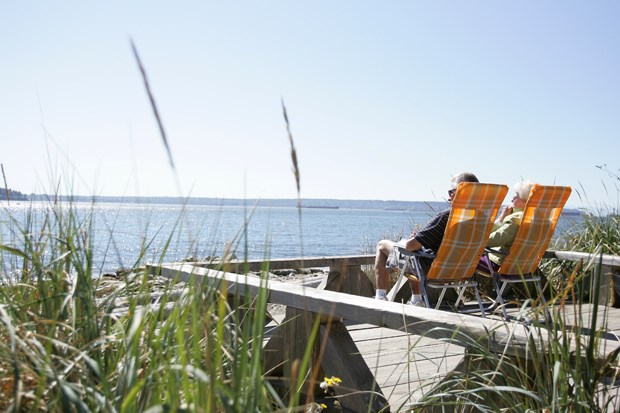Most of us enjoy the summer weather, but if temperatures rise to very high levels they can pose a serious health risk for seniors.
With North Shore temperatures in the high 20s recently, we need to look at how we can take care of our most vulnerable.
A senior’s body can’t fight the heat as well as they once could. The human body loses the ability to regulate temperature as it ages for a number of reasons.
Some research says seniors should drink more water when doing any physical activity in warm and dry climates, even if they do not feel thirsty or are not sweating.
A 2012 Health Canada report says that “Heat illnesses can affect you quickly, and can lead to long-term health problems and even death. These illnesses are mainly caused by being over-exposed to extreme heat especially if you are doing too much for your age and physical condition. Heat illnesses include heat edema (swelling of hands, feet, and ankles), heat rash, heat cramps (muscle cramps), heat fainting, heat exhaustion and heat stroke.”
It is important to watch for symptoms of heat illness in ourselves and others.
According to Health Canada, these could include dizziness or fainting, nausea or vomiting, headache, rapid breathing and heartbeat, extreme thirst and decreased urine with unusually dark yellow urine. If you have any of these symptoms during extreme heat, move to a cool place and drink liquids right away. Water is best, no alcohol or caffeine, both of which dehydrate.
What can we do to prevent heat illness? Health Canada’s website says one of the best ways to prevent heat illness is to stay hydrated. They suggest reminding yourself to drink water by leaving a glass by the sink, flavouring water with natural fruit juice (which may make it more appealing), eating more fruits and vegetables as they have a high water content, and drinking water before and after physical activity.
They also recommend staying indoors or finding a cool place to be, like a tree-shaded area, a swimming facility, or an air-conditioned spot like a shopping mall, grocery store, or public library. If you are at home use more fans, keep the sun out with drapes and screens, and avoid using your oven. Take cool showers if your house is too hot. You can keep cool by misting your skin (my personal favourite) with a spray bottle and wearing light, loose-fitting clothing.
Remember to use sunscreen, and wear hats and protective, but loose, lightweight clothing.
If you are not a senior check in on anyone you know who is, especially in the 65- to 74-year-old range.
A study called “Shifts in Mortality During a Hot Weather Event in Vancouver, British Columbia: Rapid Assessment With Case-Only Analysis” of the 2009 heat wave showed that 110 people in that age group died as result of heat illness.
One of the researchers of the study, Sarah B. Henderson, said that this age group may be more vulnerable as they are mostly living at home, not in an air conditioned care facility.
Health Canada also offers these tips:
- Tune in regularly to local weather forecasts and alerts so you know when to take extra care.
- Arrange for regular visits by family members, neighbours, or friends during very hot days in case you need assistance. Visitors can help identify signs of heat illness that could be missed over the phone.
Margaret Coates is the co-ordinator of Lionsview Seniors’ Planning Society. She has lived on the North Shore for 48 years and has worked for and with seniors for 20 of those years. Ideas for future columns are welcome Email: lions_view@telus.net.



